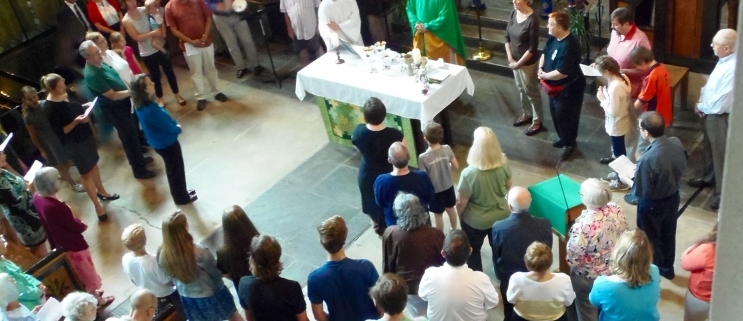Proper 13A-23
Immanuel Lutheran, Chicago
Jesus said, “You give them something to eat” (Matthew 14:16). The disciples were willing to disrupt their families and uproot their lives for a front row seat on the moving adventure that was the Jesus-event on its way to becoming the Christ-event—but you can almost see their jaws drop when Jesus said it was their turn to make supper.
John the Baptist was dead. Jesus retreated into the wilderness alone to pray. The disciples hurried in pursuit along with their new best friends (5,000 men plus women and children). They hadn’t stopped to think about how they would feed themselves once they found him. They had with them only a peasant’s lunch consisting of a few loaves of bread and some dried fish. Confronted with the question of dinner their first idea sounds a lot like my kids. Can’t we just order out?
This story of Jesus’ feeding the crowds was a favorite among early Christians. Like the parables of the Kingdom, we read the last two Sundays, this story is about entering the Kingdom of God that is already, always, present but also hidden in our midst.
All four gospels tell this story, but only Matthew places it immediately following the death of John the Baptist. Matthew draws a sobering contrast between the meal hosted by Jesus in the wilderness, and the sumptuous party King Herod threw for himself on his birthday and the 1 percenters of ancient Palestine in his fancy castle. The compassion of the one meal stands in sharp contrast to the vindictiveness of the other (Walter Bruggeman)
The first Christians plainly thought of this story as a message about the Eucharist. They perceived the great irony in the contrast between the sumptuous feast provided by King Herod (that occurs in Matthew’s gospel immediately before our reading today), and the simple, abundant banquet provided by Jesus in the wilderness. Whereas Herod is afraid of the crowd (v. 5) and of what his guests might think of him if he goes back on his word (v.9), Jesus has compassion and cares for the crowd (v. 14), even though they interrupted his desire to be alone to grieve the death of John the Baptist (13a). Herod is tricked into putting John to death (v. 10). Whereas Jesus provides life by curing the sick (v. 14) and feeding the hungry (v. 19). Wealthy King Herod destroyed a life, whereas Jesus restores lives.
The feeding of the five thousand is a message about the kind of community God intends for us. Diverse people from all walks of life become part of a single family and are fed at the same table. Here is a foretaste of the feast to come when people of every nation are united in faith and love toward God. Here is the bread of life, in Christ Jesus, like manna from heaven. Here is the forever promise of God to bring abundance out of scarcity. Here is the blessing and the challenge to offer to others what we have been given –our compassion, our energy, our vision—as well as our food and material resources.
Jesus’ presence brings into stark relief the clash between the kingdom of heaven and the kingdoms of the earth. God’s ways and our ways are not the same. One of the findings of French economist, Thomas Pickety, is that left to its own devices, market-based economies always gravitate towards greater and greater inequality and create more and more poor people. The market, by itself is not an answer to the problems of poverty and hunger. It takes more than money to make a feast of love and community like that freely offered to us in Christ Jesus.
And yet, to defeat poverty and hunger, we must closely examine our relationship to money. We must evaluate the ways we participate in a culture of private opulence and public squalor that helps the rich and hurts the poor. Scarcity is a lie we are too eager to believe. Princeton sociologist Matthew Desmond says if the top 1% of Americans just paid the taxes they owed, it would raise $175 billion each year. “That,” he says, “is just about enough to pull everyone out of poverty.” We will not solve the problem of poverty with Christian charity alone. It must be addressed through effective public policies we create together.
Jesus shifted the disciple from a mind-set of scarcity to one of abundance. Challenged to make dinner, the disciples looked and saw an open wilderness, lined with people. They counted their rations – “five loaves and two fish.” They accounted for the time of day – “the hour is now late.” But they failed to account for Jesus. They failed to account for what happens when love is at the center rather than our narrow self-interest. The decisive difference between the opulent meal and culture of violence served up by King Herod, and the simple abundant, and inclusive community the disciples ultimately prepared was Jesus at the center.
The prophet Isaiah asks, “Why do you spend your money for that which is not bread, and your labor for that which does not satisfy?” (Isaiah 55:2-3). Jesus paints a picture of the life God intends for us. It operates with different software. It’s built on a value system that is altogether different. Food such as the world offers must be bought and consumed again and again, but the food that God offers is of a different sort whose nourishment never fails.
That everlasting nourishment is love and love must never merely about the poor or about our society but is always about the people standing right in front of us. The American poet Christian Wiman has said, “If nature abhors a vacuum, Christ abhors a vagueness. If God is love, Christ is love for this one person, this one place, this one time-bound and time ravaged self.” Reluctant, disbelieving and under protest, the disciples offered the crowd the not-enough that was theirs, and it was enough, in fact, it was more than enough.
Jesus’ messianic powers include and involve our poor efforts. God’s work is done through our hands. “You give them something to eat.” It is the disciple’s own food that Jesus uses to do this miracle. Out of scarcity God produces an abundance. Out of fear, life in Christ makes for peace. As the Prophet Isaiah foretold, on that day we shall dwell together in the shelter of the Lord, we “…shall go out in joy and be led back in peace; the mountains and the hills before you shall burst into song, and all the trees of the field shall clap their hands” (Isaiah 55:12). See! Jesus has prepared a great banquet for you today. Come, eat, be filled, and live.

